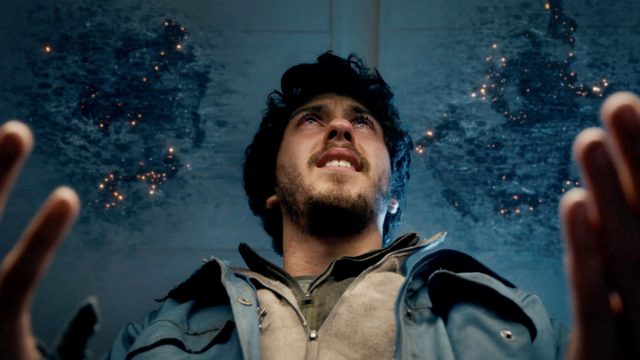Mortal: Flogging a Dead Norse, by David Bax

André Øvredal’s Mortal does that thing where the movie starts by displaying the definition of its title. But this isn’t, like, Arbitrage or whatever. We know what the word mortal means. It’s indicative of the entire movie’s unearned, half-witted sense of portent. It doesn’t get any better from here.
Nat Wolff stars, ostensibly, as Eric Bergland, an American who has returned to his ancestors’ homeland of Norway only to suddenly discover he has powers that he can’t control, leading to innocent people who happen to cross his path suddenly burning alive or being struck by lightning. Taken into custody, he’s assigned a psychologist, Christine (Iben Akerlie), who may be the only person actually willing to help Eric understand what’s happening to him. I say that Wolff is the ostensible star because, for almost the entire movie, he’s a completely passive character, in a way that becomes repetitive as terrible things keep happening to people around him. Akerlie seems to be the real lead, until she’s thoroughly sidelined during the half-baked finale.
Until the climax, Eric just spends most of the movie just brooding. Actually, he does that during a lot of the ending, too; apparently, even unlocking the answers to his mysterious powers isn’t enough to animate him. Meanwhile, the movie broods along with him, replete with gloomy, empty, moody shots like the typical Malick-biting close-up of a hand running along the top of tall grass. It’s hard to believe that Øvredal made 2010’s Trollhunter. Not that that movie is a masterpiece or anything but what the hell happened to the guy’s sense of fun?
There are multiple scenes of massive conflagrations or extreme meteorological events but even these fail to quicken the pulse. They’re better described as visual effects sequences than action ones.
If there’s one thing of interest going on in Mortal, it’s in the movie’s curiosity about religious belief and what inspires it. As the supernatural occurrences caused by Eric begin to make the news, reactions are varied. Among the devout, some see him as a messenger from their god, some as an affront. Among others, Eric himself begins to be treated as a deity. But then Øvredal’s screenplay (co-written with Norman Lesperance and Geoff Bussetil) decides on a firm mythology, a set of rules like you’d find on a run-of-the-mill genre television series.
In fact, more than anything else, Mortal feels like an extended pilot for a Netflix show, right down to its de rigueur chilly color palette. Having first planted the seeds of an unnecessary romance between Eric and Christine and then introduced a massive backstory minutes before ending, Øvredal seems to be hoping you’ll let the second episode autoplay after the credits begin to roll. But that second episode doesn’t exist and, based on this tepid entry, it likely never will.






























